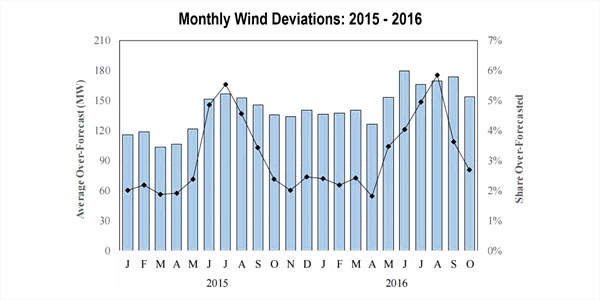By Amanda Durish Cook
CARMEL, Ind. — Some wind generators appear to be deliberately over-forecasting their output to inflate their revenues, according to MISO Independent Market Monitor David Patton, who called for rule changes to discourage gaming.
Patton said wind units on average produced 146 MW less than their MISO dispatch instructions in 2015 and 2016 (excluding economic curtailments and manual redispatch), a higher deviation than any other resource class in the RTO.
Patton told the Market Subcommittee on Nov. 29 that much of the problem lies with MISO’s day-ahead margin assurance payment (DAMAP), which guarantees day-ahead profit when real-time dispatch is less than the day-ahead schedule. MISO uses wind operators’ forecasts to determine their dispatch level.
Two-thirds of MISO’s $7.5 million in DAMAP payments to wind resources in 2015 and 2016 was because of over-forecasting and only $2.5 million was spent on curtailment, Patton said. “Most of our wind DAMAP payments are unjustified,” he said.
Patton: Eliminate DAMAP for Wind
Patton said the DAMAP should be eliminated for wind resources once MISO adopts five-minute settlements. He reasons that because wind is a fast-ramping resource, operators will want to be paid in real-time prices rather than collecting DAMAP.
Patton also called for a change in rules that encourage wind generators to err on the high side in their forecasts to ensure they receive a dispatch signal that does not limit their output. Wind resources producing above their dispatch signal can be subject to excess energy penalties, but MISO settlement rules are less punitive for wind resources that fall below their forecast output.
Patton recommended wind suppliers be incentivized to submit accurate forecasts by giving them more “headroom” and relaxing excessive energy charges when the system is unconstrained. He also suggested MISO automate its validation of market participant forecasts.
“If we balance these objectives well, the wind suppliers will be happy, the grid operators will be happy and those that have to contribute to the DAMAP payments will be happy,” Patton said.
Over-forecasting leads to supply-demand imbalances, he said, with MISO deploying regulating reserves and under-utilization of the grid as the RTO dispatches the system to make room for the over-forecasted energy.
‘Sustained Biases’
Patton said that although larger wind producers generally have lower forecasting errors than smaller ones, “a number of large and small wind suppliers exhibit large sustained forecast biases.” Patton said over-forecasting is more prevalent in summer, when energy prices are higher.
He said wind operators might be violating their obligation to provide accurate information to MISO. He noted that FERC is similarly concerned about evidence of over-forecasting.
Patton also said more research is needed to put a price on how much the over-forecasting costs MISO and that he may offer more definitive solutions in his 2016 State of the Market Report.
MISO Responds
Jeff Bladen, executive director of market services, said MISO staff will work with the Monitor on potential fixes. “We aren’t seeing broad-based market manipulation for sure, but we may have a market inefficiency that we want to close up as soon as practical. Certainly there’s work in front of us to assess and get advice,” Bladen said.
DTE Energy’s Nick Griffin said he would like to see MISO and the Monitor provide similar deviation averages for other asset classes. But he said he could support removing forecasting capability from wind units if gaming is discovered.
“Wind resources are in a difficult position because they face different challenges than other resources,” Patton said. “They have to manage something that’s fundamentally different than other resources. When we suggest that wind resources should be treated differently, it’s because they have a challenge that other asset owners do not have to face.”





